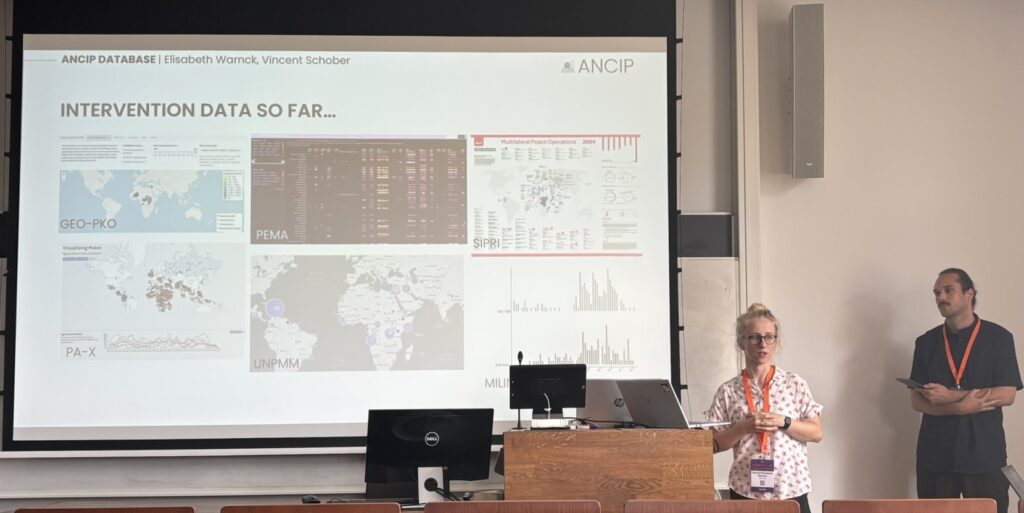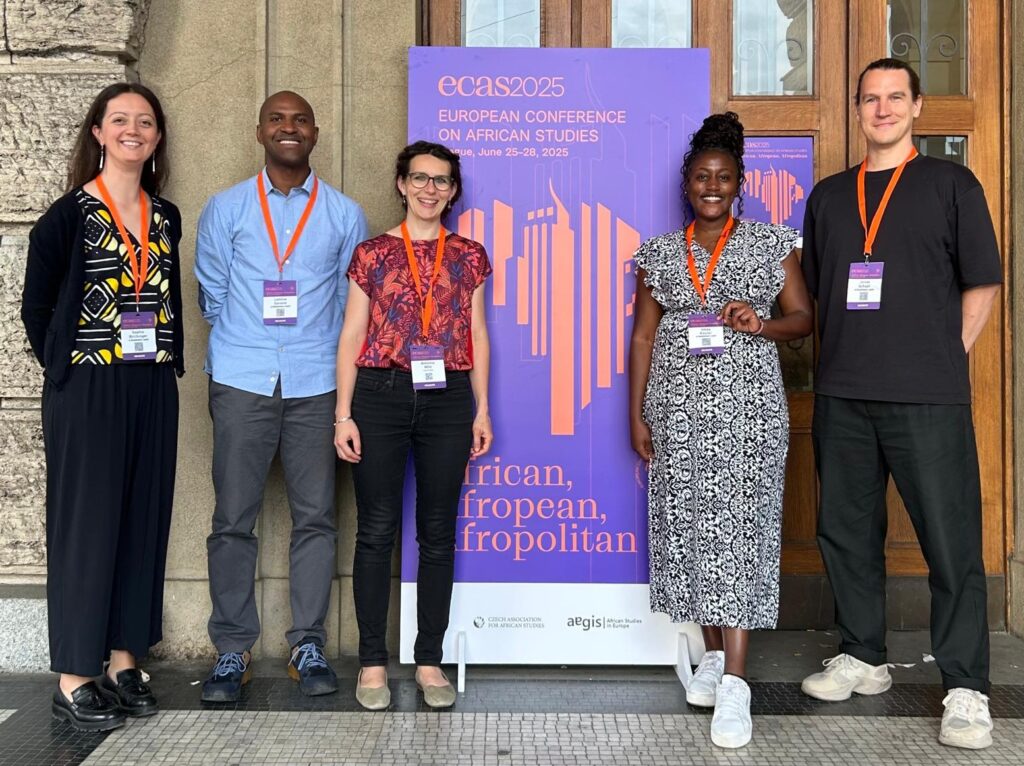
Picture by © Vincent J. Schober
ANCIP at the 10th European Conference on African Studies 2025 in Prague (25–28 June 2025)
The 10th European Conference on African Studies (ECAS) took place in Prague from 25 to 28 June 2025, under the motto “African, Afropean, Afropolitan”. The conference highlights an important set of contemporary questions and perspectives concerning the places and relationships of, and the struggles between, the various versions, voices and experiences of Africa, Africans and Africanness across time and space. Eleven members of the ANCIP network, as well as ANCIP Fellow Cheryl Hendricks (Institute for Justice and Reconciliation, Cape Town), actively contributed to these issues by presenting their research findings, organising panels, and serving as discussants.
The panel on “African Interventions: Straddling Military and Non-Military Intervention Practices’, organised by Christof Hartmann (ANCIP PI, University of Duisburg–Essen) and Cheryl Hendricks, included three ANCIP contributions. In their presentation on “African Union and ECOWAS intervention practices: Introducing the ANCIP database”, S. Elisabeth Warnck and Vincent Schober (both Leipzig University) discussed the inter-relation of six intervention practices through considering individual and collective actors of the African Union and ECOWAS and analyzing intervention sites more closely. Hilda Milka Koyier (PRIF) presented her reconstruction of both the practices of the AU and ECOWAS in establishing liaison offices for purposes of conflict intervention, and the actual practices of deployed liaison officers during their engagement in conflict interventions on the ground in her presentation titled “Sites of Intersection: Understanding African (non-military) interventions through AU and ECOWAS representations on the ground.” The third presentation in this panel from the ANCIP network by Mona Saleh (University of Duisburg–Essen) titled “Unpacking ECOWAS-Donor Relationships through the Lens of Practice Theory” focused on the redefinition of donor-recipient dynamics. She offered a nuanced understanding of the dynamics between ECOWAS and external donors in African non-military conflict interventions, highlighting the significant agency and strategic influence ECOWAS exerts. All contributions benefited from comprehensive feedback from ANCIP Fellow Cheryl Hendricks, and Christof Hartmann, who served as discussants in this panel.

Picture by © Camille Vern
In the CRG African Politics and International Relations Panel on “Integrating the African Peace and Security Architecture: Links and Disconnects” organised by Jamie Pring (United Nations University Institute on Comparative Regional Integration Studies, Bruges, and University of Basel), ANCIP PI Antonia Witt (PRIF) and ANCIP Fellow Emma Birikorang (Kofi Annan International Peacekeeping Training Centre, Accra), two presentations from the ANCIP network contributed with a “from below” perspective. Emma Birikorang could not be present in Prague for a good reason: she was invited to give remarks to the UN General Assembly in New York as part of the high-level thematic debate on the multifaceted aspects of peace and security in Africa and the future of peacekeeping operations.
Jonas Schaaf (PRIF) and Lamine Savané (Université de Ségou/PRIF) presented a paper written with Issaka K. Souaré and Antonia Witt on the inclusion of civil society actors in AU and ECOWAS interventions, emphasizing the importance of informal practices in connecting with the APSA. Their paper under the working title “(Dis-)connecting with civil society in African regional interventions: Reconstructing AU and ECOWAS practices in Guinea and Mali explores patterns in the inclusion of civil society actors in AU/ECOWAS interventions. Also emphasising the aspect of informal practices, Jasmin Schmitz (University of Duisburg–Essen) argued in her presentation on “National Infrastructure for Peace and ECOWAS – Exploring Formal and Informal Peacebuilding Networks”, how the different structure of national infrastructures conditions the ability of ECOWAS to engage. The presenters are grateful for the feedback they received from the panel’s discussants, Linnéa Gelot (Swedish Defence University) and Nurit Hashimshony-Yaffe (Academic College of Tel Aviv).

Picture by © Antonia Witt
In the panel “Women, Peace and Security in Africa: Whose agenda?”, Camille Vern (Leipzig University) presented from her in-depth case studies on the achievements and obstacles of the two African institutionalised organs for the WPS agenda implementation, the AU Panel of the Wise and the AUs Special Envoy on Women, Peace and Security.
ANCIP members also contributed to panels beyond the topic of the research network, including Ulf Engel’s (ANCIP PI, Leipzig University) panel, together with Christi van der Westhuizen (Nelson Mandela University, Gqerberha), on “Rethinking ‘social cohesion’ as European knowledge formation: African epistemologies, cosmologies and practices.” In his presentation within this panel, he focused on “The Political Economy of Social Cohesion: The Role of African Regional Organizations and International Donors.” Antonia Witt presented her work on “Anticipating and governing violent extremism: Insights from Ghana” in a panel on “Knowing violent extremism in Africa: The politics of uncertainty and anticipation” that she co-organised with Linnéa Gelot. Further, Mona Saleh took up the discussant role in the panel “Implementing African Peace Agreements”, that she co-hosted with Michael Aeby (University of Basel, and University of Cape Town, respectively).

Picture by © Camille Vern
ECAS Conference 2025
Date
June 25-28, 2025
Location
ECAS, Prague

